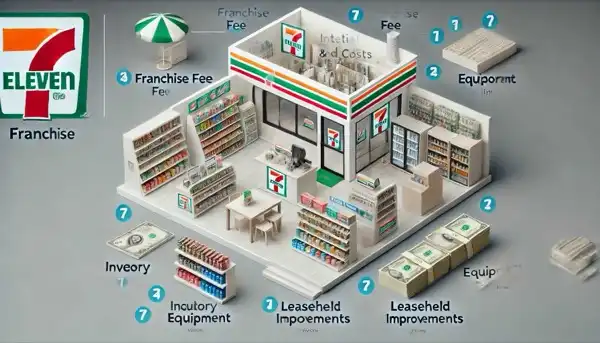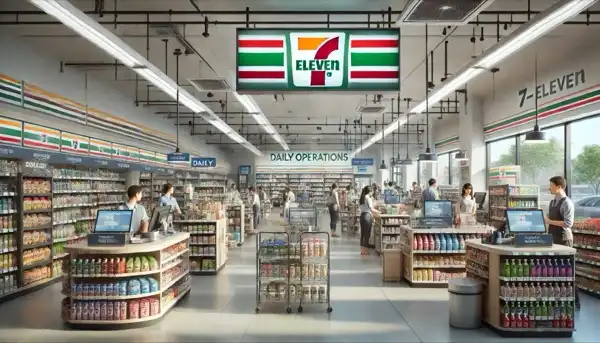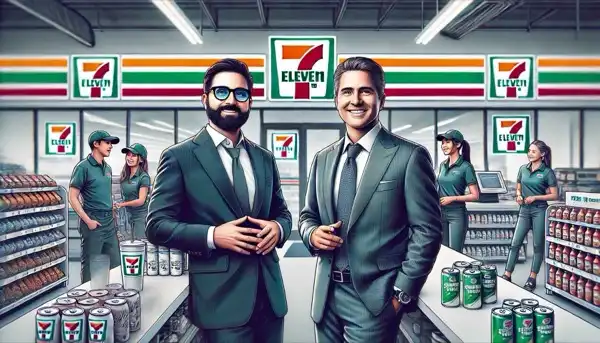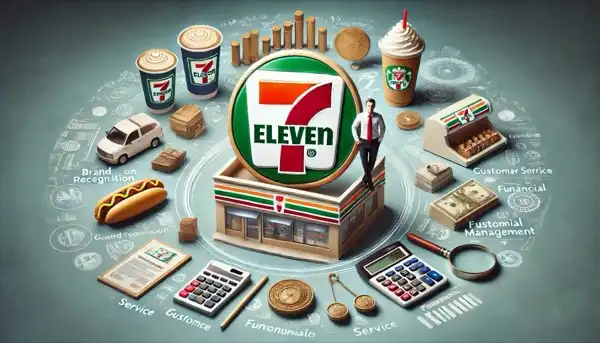Starting a 7-Eleven Business: Insights for Aspiring Entrepreneurs

Hey there, it’s John Doe! Today, let’s talk about something super exciting—starting your own 7-Eleven franchise.
If you’ve ever thought about owning a convenience store, this post is for you. We’ll cover everything from startup costs to daily operations and even hear from successful franchise owners.
Starting a 7-Eleven business is a great opportunity. You get a well-known brand, a proven business model, and lots of support to help you succeed.
Before we dive in, a big thank you to our interviewees for sharing their stories and tips.
By the end of this post, you’ll know what it takes to start and run a 7-Eleven franchise. We’ll talk about costs, challenges, and the rewards of owning one of these stores.
So, let’s get started!
From Franchise Startup Costs to Daily Operations – What You Need to Know

Starting a 7-Eleven franchise involves various steps and costs. Understanding these can help you make an informed decision.
First, let’s break down the startup costs. These include the initial franchise fee, inventory, equipment, and leasehold improvements. On average, the total initial investment ranges between $50,000 and $1 million, depending on the store location and size.
Daily operations are just as important. Running a 7-Eleven means managing inventory, hiring staff, and providing excellent customer service. The support from 7-Eleven’s corporate team is a huge plus. They offer training and ongoing assistance to ensure your success.
Next, let’s talk about what makes a 7-Eleven franchise a good opportunity. The brand is well-known, and the business model is proven. This means you have a higher chance of success compared to starting a business from scratch.
Remember, like any business, it requires hard work and dedication. But with the right mindset and tools, you can make it work.
7-Eleven Franchise Success Stories: Effective Business Models and Franchise Owner Interviews

Interviewee Introductions
Let’s meet two successful 7-Eleven franchise owners.
- Jamie Lee: A 37-year-old from Los Angeles with 15 years of retail experience. Jamie is passionate, friendly, and community-focused.
- Mark Davis: A 45-year-old from Austin with 20 years of franchise experience. Mark is analytical, efficient, and tech-savvy.
Starting a 7-Eleven Business: Motivation and Initial Steps
Jamie and Mark had different motivations for starting their 7-Eleven franchises. Jamie wanted to connect with her community and provide a needed service. Mark saw it as a profitable investment with a solid support system.
For initial funding, Jamie used a combination of personal savings and a small business loan. Mark leveraged his experience and secured a significant franchise loan.
Their startup processes involved thorough market research, location scouting, and training provided by 7-Eleven.
Current 7-Eleven Franchise Business Operations and Market Analysis
Both Jamie and Mark have thriving businesses. Jamie’s store is a community hub, known for its friendly service and clean environment. Mark’s store is efficient and technologically advanced, focusing on quick service and inventory management.
They measure success through customer satisfaction, sales growth, and profitability. Regular feedback from customers helps them improve and adapt their services.
7-Eleven Franchise Reviews: Franchise Benefits and Challenges

Benefits of Owning a 7-Eleven Franchise
According to Jamie, the biggest advantage of owning a 7-Eleven franchise is the strong brand recognition. Customers trust the brand, which helps drive consistent traffic to the store. She also appreciates the support system provided by 7-Eleven, including training, marketing, and operational assistance.
Mark highlights the efficiency of the business model. With a streamlined process and continuous support, he can focus on growth and customer satisfaction. The franchise’s ability to adapt and introduce new products keeps it competitive and relevant.
Challenges of Owning a 7-Eleven Franchise
Both Jamie and Mark agree that running a 7-Eleven franchise is not without its challenges. Jamie mentions the long hours and the need to be constantly available to manage the store. Balancing work and personal life can be difficult.
Mark points out the financial pressure of maintaining profitability while managing expenses like rent, utilities, and employee wages. Keeping up with competition from other convenience stores and supermarkets is also a constant challenge.
Enhancing 7-Eleven Business: Service Differentiation and Customer Experience in Franchises
Jamie and Mark use different strategies to set their stores apart. Jamie focuses on creating a welcoming environment with personalized customer service. She organizes community events and promotions to build strong local ties.
Mark leverages technology to enhance customer experience. He uses automated systems for inventory management and offers quick, contactless payment options. Both owners emphasize the importance of listening to customer feedback and making improvements based on their needs.
7-Eleven Franchise Expansion Plans: Future Prospects and Franchise Growth Strategies
Business Expansion Plans
Both Jamie and Mark have plans to expand their 7-Eleven franchises. Jamie is looking to open a second store in a neighboring community. She believes that her successful management of the first store has given her the experience and confidence to handle multiple locations.
Mark, on the other hand, is focused on enhancing the technology in his current store before expanding. He plans to introduce more automated services and improve the online presence of his store. Once these systems are in place, he aims to open additional locations.
Future Prospects and Industry Challenges
Jamie sees a bright future for the 7-Eleven brand. She anticipates steady growth as more people seek convenience in their shopping experiences. However, she also acknowledges the challenges of adapting to changing consumer preferences and competition.
Mark is optimistic about the role of technology in shaping the future of convenience stores. He believes that innovations in delivery services and automated checkout will be key to staying competitive. Yet, he is aware of the ongoing challenges, such as rising labor costs and maintaining high customer satisfaction.
Key Strategies for Franchise Growth
Both Jamie and Mark emphasize the importance of community engagement and customer feedback. Jamie plans to continue hosting events and promotions to strengthen her store’s relationship with the local community. Mark is focused on using data to drive decisions and improve efficiency.
They also agree on the importance of staying adaptable and continuously improving their business models. Whether through new technology or enhanced customer service, their goal is to provide the best possible experience for their customers.
7-Eleven Franchise Business: Actual Franchise Startup Costs, Loan Options, and 7-Eleven Investment
Jamie Lee’s Startup Costs
Jamie started her 7-Eleven franchise in Los Angeles with a total initial investment of $200,000. Here’s the breakdown:
- Franchise Fee: $30,000
- Inventory and Equipment: $70,000
- Leasehold Improvements: $50,000
- Miscellaneous Costs: $50,000 (includes licenses, permits, and initial marketing)
Jamie financed her investment with a combination of personal savings and a small business loan. She took a $100,000 loan and used $100,000 from her savings.
Mark Davis’s Startup Costs
Mark launched his 7-Eleven franchise in Austin with a total investment of $170,000. Here’s how it was allocated:
- Franchise Fee: $30,000
- Inventory and Equipment: $60,000
- Leasehold Improvements: $40,000
- Miscellaneous Costs: $40,000 (covers licenses, permits, and marketing)
Mark used a business loan for $80,000 and contributed $90,000 of his own money.
Loan Options and 7-Eleven Investment
For aspiring 7-Eleven franchise owners, there are several financing options available. Many franchisees use a mix of personal savings, small business loans, and sometimes even franchisor financing. It’s essential to have a solid financial plan and understand all associated costs.
Monthly Sales Data for 7-Eleven Franchise
Jamie Lee’s Store:
- Location: Los Angeles
- Recent Monthly Sales: $90,000
- Beverages: $25,000
- Snacks and Packaged Foods: $30,000
- Prepared Foods: $15,000
- Lottery Tickets: $10,000
- Miscellaneous Items: $10,000
- Monthly Expenses:
- Inventory Costs: $40,000
- Rent: $10,000
- Salaries and Wages: $15,000
- Utilities and Maintenance: $5,000
- Other Expenses: $10,000
- Net Profit: $10,000
Jamie’s store is strategically located in a high-traffic area of Los Angeles. This prime location contributes significantly to her sales, especially in beverages and snacks, which are popular among busy customers.
Mark Davis’s Store:
- Location: Austin
- Recent Monthly Sales: $85,000
- Beverages: $20,000
- Snacks and Packaged Foods: $25,000
- Prepared Foods: $20,000
- Lottery Tickets: $8,000
- Miscellaneous Items: $12,000
- Monthly Expenses:
- Inventory Costs: $38,000
- Rent: $8,000
- Salaries and Wages: $14,000
- Utilities and Maintenance: $4,000
- Other Expenses: $12,000
- Net Profit: $9,000
Mark’s store in Austin benefits from a tech-savvy customer base. His focus on prepared foods and quick service options drives higher sales in those categories. Efficient cost management helps him maintain a healthy profit margin.
Average Monthly Revenue for 7-Eleven Franchise
The average monthly revenue for a 7-Eleven franchise, as illustrated by Jamie and Mark’s experiences, can range significantly based on location and operational strategy. A well-managed store in a good location can see revenues upwards of $85,000 to $90,000 monthly.
Expected Monthly Earnings for 7-Eleven Franchise Owners
Based on Jamie and Mark’s operations, the expected monthly earnings for 7-Eleven franchise owners can be around $9,000 to $10,000 in net profit. These earnings can vary depending on sales volume, cost management, and external market factors.
Expert Tips for Aspiring 7-Eleven Entrepreneurs: Key Insights and Advice
Advice from Jamie Lee
1. Understand Your Market:
Jamie stresses the importance of market research. Before opening her store, she spent months understanding the needs and preferences of her local community. This helped her stock the right products and offer services that cater to her customers.
2. Build Community Connections:
Jamie believes that strong community ties are vital for success. She regularly participates in local events and supports community initiatives. This not only boosts her store’s reputation but also fosters customer loyalty.
3. Focus on Customer Service:
Excellent customer service is Jamie’s top priority. She trains her staff to be friendly, helpful, and efficient. A pleasant shopping experience keeps customers coming back.
Advice from Mark Davis
1. Leverage Technology:
Mark emphasizes the role of technology in modern retail. He uses advanced inventory management systems and offers digital payment options. This improves efficiency and enhances the customer experience.
2. Manage Finances Wisely:
Mark advises aspiring franchise owners to keep a close eye on their finances. Budgeting for unexpected expenses and maintaining a cash reserve can help manage financial stability.
3. Continuous Improvement:
Mark believes in constantly seeking ways to improve. Whether it’s updating store layouts, introducing new products, or enhancing service quality, staying proactive and adaptable is key.
Key Insights
1. Be Prepared for Hard Work:
Both Jamie and Mark agree that owning a 7-Eleven franchise requires dedication and effort. Long hours and hands-on management are part of the job, but the rewards are worth it.
2. Utilize 7-Eleven’s Support:
Take full advantage of the training and support offered by 7-Eleven. From marketing assistance to operational guidance, these resources are invaluable for new franchise owners.
3. Stay Customer-Focused:
Understanding and meeting customer needs is crucial. Whether through personalized service or community engagement, a customer-focused approach drives success.
Market Analysis: Competitor Insights and Franchise Opportunities
Major Competitors
1. Circle K:
- Market Share: Circle K is a major player in the convenience store market with a strong presence globally.
- Price Strategy: Competitive pricing on everyday items and frequent promotions.
- Product Variety: Wide range of products including fresh food options.
- Customer Service: Known for friendly service and clean stores.
- Marketing Strategy: Extensive use of digital marketing and loyalty programs.
- Technology: Use of advanced technology for inventory management and customer engagement.
2. Speedway:
- Market Share: Strong presence in the U.S. with a focus on fuel and convenience store sales.
- Price Strategy: Competitive fuel prices and value deals on store items.
- Product Variety: Offers a variety of snacks, beverages, and prepared foods.
- Customer Service: Emphasis on quick service and customer satisfaction.
- Marketing Strategy: Aggressive promotions and reward programs.
- Technology: Implementation of self-service kiosks and mobile app integrations.
3. Wawa:
- Market Share: Popular in the eastern U.S., known for its high-quality food offerings.
- Price Strategy: Premium pricing for fresh food and specialty beverages.
- Product Variety: Extensive menu of fresh food, coffee, and beverages.
- Customer Service: Exceptional customer service with a focus on convenience and speed.
- Marketing Strategy: Strong social media presence and community involvement.
- Technology: Advanced ordering systems and mobile app for convenience.
Successful Franchise Strategies
Unique Service Offerings:
7-Eleven stands out with its unique product offerings like Slurpee and Big Gulp. These iconic products drive customer loyalty and brand recognition.
Customer-Centric Services:
7-Eleven’s focus on customer satisfaction, from 24/7 service to personalized promotions, sets it apart from competitors.
Community Engagement:
Strong ties with local communities through sponsorships and events help build a loyal customer base.
Sustainability Efforts:
Efforts towards sustainability, such as reducing plastic use and promoting eco-friendly products, attract environmentally conscious consumers.
Competitor Comparison
Price Strategy Comparison:
7-Eleven offers competitive pricing similar to Circle K and Speedway but also introduces unique value deals to attract budget-conscious customers.
Product Variety Comparison:
While Wawa excels in fresh food offerings, 7-Eleven’s diverse range of snacks, beverages, and prepared foods meets varied customer preferences.
Customer Service Comparison:
7-Eleven’s 24/7 service and focus on convenience is comparable to competitors, ensuring it remains a go-to choice for quick shopping needs.
Technology and Innovation Comparison:
7-Eleven continues to innovate with mobile apps and self-checkout options, keeping pace with technological advancements in the industry.
Emerging Franchise Trends and Market Shifts: Future Predictions for Franchise Growth
Industry Trends
1. Increased Focus on Technology:
The convenience store industry is rapidly embracing technology. Self-checkout kiosks, mobile apps for ordering and payments, and advanced inventory management systems are becoming standard. 7-Eleven is at the forefront, continuously integrating these technologies to enhance customer experience and streamline operations.
2. Health and Wellness Products:
There is a growing demand for healthier snack options and beverages. Consumers are becoming more health-conscious, and 7-Eleven is responding by expanding its range of nutritious products, including organic snacks and fresh food options.
3. Sustainability Efforts:
Sustainability is becoming increasingly important. 7-Eleven is focusing on eco-friendly practices such as reducing plastic use, offering recyclable packaging, and promoting energy-efficient store designs. These efforts not only attract environmentally conscious customers but also reduce operational costs.
Market Shifts
1. Urbanization:
With more people moving to urban areas, there is a higher demand for convenience stores in city centers. 7-Eleven is strategically opening new stores in high-traffic urban locations to meet this demand.
2. Changing Consumer Preferences:
Consumer preferences are shifting towards convenience and speed. 7-Eleven’s 24/7 availability and quick service options align perfectly with these trends, making it a preferred choice for busy individuals.
3. Competition and Consolidation:
The convenience store market is competitive, with major players like Circle K, Speedway, and Wawa constantly innovating. To stay ahead, 7-Eleven is focusing on unique product offerings, superior customer service, and strategic partnerships to enhance its market position.
Future Predictions for Franchise Growth
1. Expansion into New Markets:
7-Eleven is expected to continue expanding into new geographic markets, both domestically and internationally. This expansion will be driven by the growing demand for convenient shopping options.
2. Innovation in Product Offerings:
Future growth will be fueled by innovative product offerings. Expect to see more health-focused products, exclusive 7-Eleven branded items, and tech-enabled services.
3. Enhanced Customer Engagement:
Improving customer engagement through personalized promotions, loyalty programs, and digital interactions will be key. 7-Eleven’s use of data analytics to understand customer behavior and preferences will drive these efforts.
Key Tips Before Starting a Franchise
1. Initial Investment Costs
Before diving into a 7-Eleven franchise, it’s crucial to understand the initial costs. You’ll need funds for the franchise fee, inventory, equipment, and store setup. For example, the total investment can range from $50,000 to $1 million, depending on location and store size.
2. Ongoing Costs
Running a franchise involves continuous expenses beyond the initial setup. Be prepared for monthly costs like rent, utilities, employee wages, and royalty fees. These recurring expenses are essential to keep the store running smoothly.
3. Understanding the Franchise Agreement
The franchise agreement is a legally binding document outlining your obligations and rights. It includes details on the contract duration, renewal terms, and fees. Thoroughly review this agreement and consider consulting a legal advisor to ensure you understand all terms.
4. Franchisor Support System
One of the advantages of a 7-Eleven franchise is the support provided by the franchisor. This includes initial training, ongoing marketing support, and operational assistance. Utilize these resources to maximize your store’s potential.
5. Market Research
Conducting thorough market research is crucial. Analyze the local market to understand customer demographics, competition, and demand. This information will help you make informed decisions and tailor your store’s offerings to meet local needs.
6. Brand Reputation
The reputation of the 7-Eleven brand plays a significant role in attracting customers. Research the brand’s market standing and customer reviews. A strong brand reputation can lead to higher customer trust and loyalty.
7. Operating Hours and Workload
Owning a 7-Eleven franchise means committing to long hours. These stores are typically open 24/7, requiring a significant time investment. Be prepared for the workload and ensure you have a reliable team to manage shifts.
8. Profitability Analysis
Perform a detailed profitability analysis before starting your franchise. Estimate your expected revenue, deduct operating costs, and determine your potential net profit. This analysis will help you assess the financial viability of your investment.
9. Learning from Other Franchisees
Gain insights from other 7-Eleven franchise owners. Learn from their experiences, both successes and challenges. This can provide valuable lessons and help you avoid common pitfalls.
10. Legal Advice
Seek legal advice when reviewing your franchise agreement and any other contractual documents. A legal expert can help you understand your obligations and protect your interests.
Conclusion
Starting a 7-Eleven franchise can be a rewarding venture, but it requires careful planning and dedication. From understanding the initial and ongoing costs to leveraging the support provided by 7-Eleven, there are many factors to consider. Jamie and Mark’s experiences highlight the importance of market research, customer service, and continuous improvement. By following these insights and tips, you can position your franchise for success and growth.
Remember, owning a 7-Eleven franchise is not just about running a store; it’s about becoming a part of a community and providing value to your customers. Stay focused, stay motivated, and success will follow.
Thank you for joining me on this journey into the world of 7-Eleven franchises. If you have any questions or need further information, feel free to reach out. Best of luck with your entrepreneurial endeavors!
FAQ
Q: What is the initial investment required for a 7-Eleven franchise?
A: The initial investment can range from $50,000 to $1 million, depending on the location and size of the store.
Q: What ongoing costs should I expect?
A: Ongoing costs include rent, utilities, employee wages, and royalty fees.
Q: What support does 7-Eleven provide to franchisees?
A: 7-Eleven offers initial training, marketing support, and operational assistance.
Q: How can I ensure the profitability of my 7-Eleven franchise?
A: Conduct thorough market research, manage your finances wisely, and continuously seek ways to improve your operations and customer service.
Q: What are the main challenges of running a 7-Eleven franchise?
A: The main challenges include long hours, high operational costs, and competition from other convenience stores.